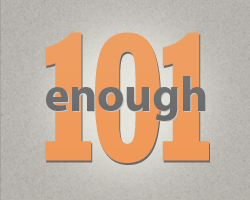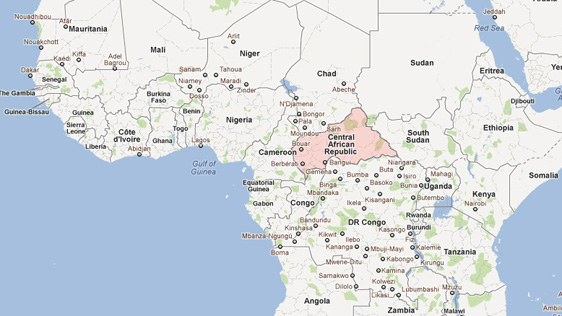
Editor’s Note: The Lord’s Resistance Army has affected the Central African Republic, or CAR, since 2007. This often-forgotten country’s tumultuous history has resulted in an almost complete lack of institutional capacity, making it an ideal refuge for and victim of the LRA. This post is a brief history that is part of the series Enough 101, intended to provide a contextual background for understanding the complex issues that the Enough Project works on.
The Central African Republic, or CAR , covers an area slightly smaller than Texas and is home to only 4.2 million people. The country is culturally and politically split between the agricultural south along the river, which borders the Republic of the Congo, Democratic Republic of the Congo, and Cameroon, and the northern savanna bordering South Sudan and Chad.

CAR was colonized by France in 1903. In 1910 the French consolidated CAR with Chad, Congo-Brazzaville, and Gabon to form the Federation of French Equatorial Africa, or AEF.
A gradual process moving towards self-government began when the post-WWII French Constitution was signed in 1946 and concluded when in 1958 the AEF dissolved and CAR became self-governing under Prime Minister Barthelemy Boganda, a former Catholic priest. Boganda died shortly thereafter in a March 1959 plane crash, and was succeeded by his cousin, David Dacko, who was supported by the French. CAR officially declared independence on August 13, 1960.
The Bokassa Era of Brutal Dictatorship, 1966-1979
Six years later, in January 1966, Dacko was overthrown in an unnecessarily bloody coup led by Colonel Jean-Bedel Bokassa. (Bokassa killed his main rival with his own hands, stabbing him repeatedly with his sword before leaving him to die.) Bokassa dissolved the National Assembly and on December 4, 1976, established himself as the emperor of the renamed Central African Empire. He enjoyed a close relationship with the French (he actually held French citizenship), and his opulent coronation, which was co-funded and co-organized by France, cost the equivalent of CAR’s annual budget.
According to the U.S. State Department, “His regime was characterized by numerous human rights atrocities,” and Bokassa was nicknamed the “Butcher of Bangui” in international press (Bangui is the capital of CAR). Living up to his name, in 1979, Bokassa had 250 protesting students beaten and jailed where many of them died, mostly from suffocation, and was known for torturing his opponents.
His human rights abuses and rumors of practicing cannibalism eventually lost Bokassa any international respectability he ever had. In the face of these accusations and France’s disapproval, Bokassa sought support from Libya’s Colonel Qaddafi, thereby alienating France. In September 1979, a French-led military intervention, “Operation Baracuda,” overthrew Bokassa and reinstated Dacko. The ‘Baracuda syndrome’ came to describe, “the infantilisation of a people that were so dispossessed of their own history that they were not even responsible for deposing their own tyrant.”
From Military Rule to Democracy, 1981-1993
The symbolic reinstating of Dacko was a thin veil for actual resumption of French colonial rule. A French secret service lieutenant-colonel, Jean-Claude Mantion, was the de facto ruler of CAR for 13 years, from 1980-1993. In September 1981, Dacko voluntarily ceded power to the military and General Andre Kolingba took over CAR leadership. Kolingba delegated most state responsibilities to Mantion and instead focused on installing members of his ethnic group in positions at state, government, and parastatal companies.
“[Kolingba] invented ethnicity, if one understands by that the manipulation of tribalism for political ends, in a country united by a true lingua franca, Sango, and in which the origin of people had not had any importance for some time,” wrote International Crisis Group in a 2007 report on the “phantom state.”
Though Kolingba was a military dictator, he guided CAR ’s first shaky steps towards democracy on a course set out by Paris. In 1985 he took a first step toward the return to civilian rule by naming a new cabinet, and in 1986 he created the Rassemblement Democratique Centrafricain, or RDC, political party and drafted a new constitution for national referendum. Due to political pressure, in 1991 a presidential-created national commission rewrote CAR ’s constitution allowing multiple political parties.
CAR’s first multi-party elections were held in 1992, but the results were cancelled due to irregularities and a re-vote scheduled for October 1993. This time around the elections were a success, and Ange-Felix Patassé won the presidency and served as president for two terms. He was elected again in 1996 and served until his overthrow in 2003.

